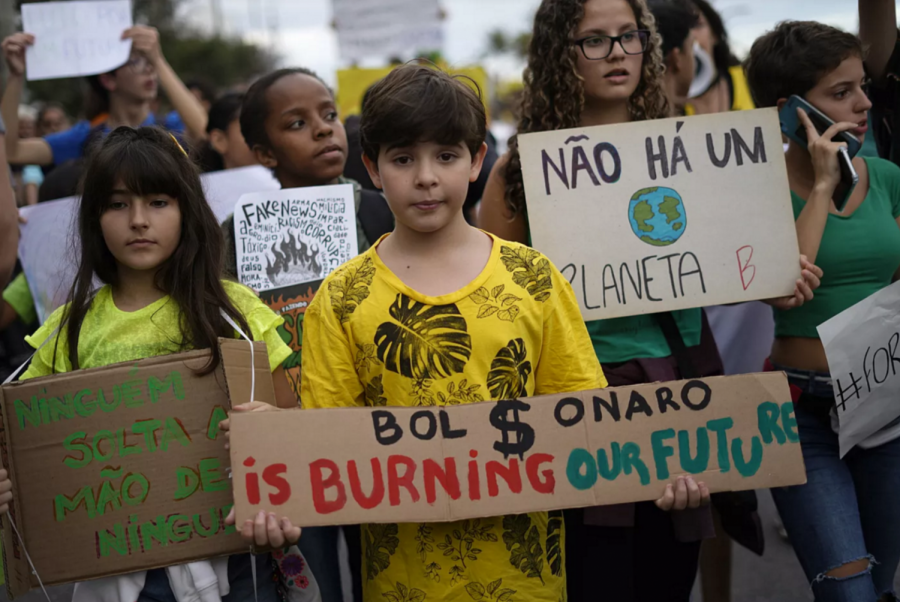The Woods Are Burning
The date was Monday, August 19th at 3 pm on a predicted sunny afternoon. Except it wasn’t a “sunny” afternoon. Any person residing in São Paulo at this time will recall the fear of the night that descended upon the city that day, and the blanket of rumors that soon followed.
Rumors that ashes could be tasted in the dark sky. That the fires reigning more than 3 thousand five hundred kilometers away were too close, too present. That the apocalypse had come, that the greed of human nature had finally come to bring forth our undoing.
I got texts, calls, emails from international friends and acquaintances– whose only connection to Brazil was our relationship– asking me if we were “really using gas masks down here?” or “isn’t half your country going to be on fire soon?”
But the tipping point was when I got an alarming email in my inbox from change.org with the all-caps title:
*EMERGENCY* THE AMAZON IS ON FIRE! TELL THE UNITED NATIONS TO HELP BEFORE IT’S TOO LATE!
This alarming email title was accompanied by a photoshopped picture of a monkey holding a crying baby in her arms amidst burning trees.
The events of August 19th unleashed a barrage of fake news and sensationalized media. The reality is that half of Brazil was not on fire, we did not use gas masks and this was not the worst burning Brazil had ever seen. The Global Forest Watch’s records go back to 2001, and the number of fires was reportedly greater in 2002-05 and 2007. Through an unlucky combination of a large cloud falling upon the city, a cold front, and a wind tunnel carrying smoke from mostly Bolivian but also some Amazon fires, the skies darkened that day: nothing more, nothing less.
How is it possible that if in the past Brazil has seen fires worse than these, and droughts bringing on forest fires have never been news before, why have so many people, so many non-Brazilian people, latched on to this topic with this level of ferocity? Why is this now a topic of news?
Because of growing awareness of human rights brought about by globalization in recent years and Bolsonaro’s controversial election into the Presidency, news of the burning Amazon culminated in a panic previously unheard of.
In early November 2018, Jair Bolsonaro was elected President of the Brazilian Republic. For the first time since the mid-’80s, a candidate who was not only not interested in forwarding the legacy of his predecessors by prioritizing environmental regulations, but was campaigning on the grounds that he would push for the deforestation of the Amazon-in the name of economic development- was inserted into office. In his campaign, he promised to scrap the Environment Ministry, which is mandated to protect the environment, and instead embolden the Agriculture Ministry, which tends to favor the interests of those who would convert forests into farmland. After stating multiple times that Brazil’s environmental policies were “suffocating the country” — he vowed to champion Brazil’s powerful agribusiness sector, which seeks to open up more forests to produce the beef and soy the world demands. The world grew fearful. Fires had raged before, but never under the power of a man not set on putting them out.
Globalization refers to the aspect of international integration: With technology breaking the barriers of distance cross-culturally and the opening up of agencies by governments all over the world, the average person nowadays has more daily interactions with people from other countries than any of our predecessors. Not just physical interaction, but with online news taking off, dangers in other parts of the world have never been closer to home. A 2018 Gallup analysis found a “global warming age gap” in some beliefs, attitudes, and risk perceptions: 70% of adults aged 18 to 34 say they worry about global warming compared to 56% of those aged 55 or older. A Pew survey also found that Gen-Yers are more supportive of stricter environmental laws, more likely to attribute global warming to human activity, and more likely to favor environmentally friendly policies such as green energy development and tax incentives for hybrid vehicles over the older generation. The highly globalized younger population that inhabit the world today is 80% more likely to pay for responsibly made products, want to work for companies that care about their impacts and choose to ride buses and bikes over cars. It’s no wonder that worry about the Amazon fires spread like wildfire.
In conclusion, the world is a more accessible, more open place: to different people and newer ideas. However, that often causes closed-mindedness in different topics. We need to be careful. Even though being more environmentally conscious is a positive thing and we need to take responsibility for the effect humans have had on the Earth, we cannot allow ourselves to be carried away. Focus all this positive energy on things that actually deserve it, don’t blow small things out of proportion.
Sources: Change.org, Globo News, Washington Post, The Guardian, The New York Times, Sustainable Brands

Life is all about the balancing of plates. Your family is a plate, each friend is a plate, each class is a plate, your clubs, a relationship, enfin. And...









